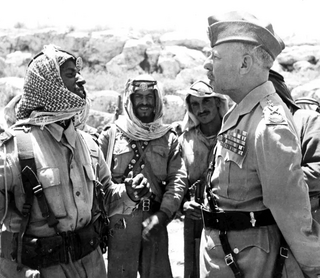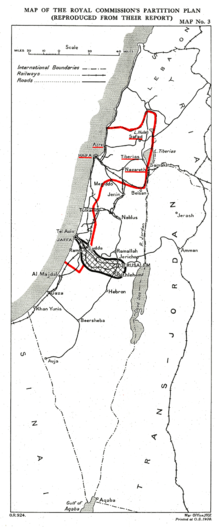
Zionism is an ethnocultural nationalist movement that emerged in Europe in the late 19th century and aimed for the establishment of a national home for the Jewish people through the colonization of Palestine, an area roughly corresponding to the Land of Israel in Judaism, and of central importance in Jewish history. Zionists wanted to create a Jewish state in Palestine with as much land, as many Jews, and as few Palestinian Arabs as possible.

The 1948 Arab–Israeli War, also known as the First Arab–Israeli War, followed the civil war in Mandatory Palestine as the second and final stage of the 1948 Palestine war. The civil war became a war of separate states with the Israeli Declaration of Independence on 14 May 1948, the end of the British Mandate for Palestine at midnight, and the entry of a military coalition of Arab states into the territory of Mandatory Palestine the following morning. The war formally ended with the 1949 Armistice Agreements which established the Green Line.

David Ben-Gurion was the primary national founder and first prime minister of the State of Israel. As head of the Jewish Agency from 1935, and later president of the Jewish Agency Executive, he was the de facto leader of the Jewish community in Palestine, and largely led the movement for an independent Jewish state in Mandatory Palestine.
During the 1948 Palestine war, massacres and acts of terror were conducted by and against both sides. A campaign of massacres and violence against the Arab population, such as occurred at Lydda and Ramle and the Battle of Haifa, led to the expulsion and flight of over 700,000 Palestinians, with most of their urban areas being depopulated and destroyed. This violence and dispossession of the Palestinians is known today as the Nakba.

Benny Morris is an Israeli historian. He was a professor of history in the Middle East Studies department of Ben-Gurion University of the Negev in the city of Beersheba, Israel. Morris was initially associated with the group of Israeli historians known as the "New Historians", a term he coined to describe himself and historians Avi Shlaim, Ilan Pappé and Simha Flapan.

Plan Dalet was a Zionist military plan executed during the 1948 Palestine war for the conquest of territory in Mandatory Palestine in preparation for the establishment of a Jewish state. The plan was the blueprint for Israel's military operations starting in March 1948 until the end of the war in early 1949, and so played a central role in the 1948 Palestinian expulsion and flight known as the Nakba.

Ilan Pappé is an Israeli historian, political scientist, and former politician. He is a professor with the College of Social Sciences and International Studies at the University of Exeter in the United Kingdom, director of the university's European Centre for Palestine Studies, and co-director of the Exeter Centre for Ethno-Political Studies. Pappé was also a board member of the Israeli political party Hadash, and was a candidate on the party list in the 1996 and 1999 Israeli legislative elections.

Yosef Weitz was the director of the Land and Afforestation Department of the Jewish National Fund (JNF). From the 1930s, Weitz played a major role in acquiring land for the Yishuv, the pre-state Jewish community in the British Mandate of Palestine.

The 1947–1948 civil war in Mandatory Palestine was the first phase of the 1947–1949 Palestine war. It broke out after the General Assembly of the United Nations adopted a resolution on 29 November 1947 recommending the adoption of the Partition Plan for Palestine.
During the 1948 Palestine war in which the State of Israel was established, around 700,000 Palestinian Arabs, or 85% of the total population of the territory Israel captured, were expelled or fled from their homes. The causes of this mass displacement have been a matter of dispute, though today most scholars consider that the majority of Palestinians were directly expelled or else fled due to fear.

During the British rule in Mandatory Palestine, there was civil, political and armed struggle between Palestinian Arabs and the Jewish Yishuv, beginning from the violent spillover of the Franco-Syrian War in 1920 and until the onset of the 1948 Arab–Israeli War. The conflict shifted from sectarian clashes in the 1920s and early 1930s to an armed Arab Revolt against British rule in 1936, armed Jewish Revolt primarily against the British in mid-1940s and finally open war in November 1947 between Arabs and Jews.

Ezra Danin was the head of the Arab section of the SHAI, the intelligence arm of the Haganah, Israeli politician and an orange grower. Danin specialized in Arab affairs.

In July 1948, during the 1948 Palestine war, the Palestinian towns of Lydda and Ramle were captured by the Israeli Defense Forces and their residents were violently expelled. The expulsions occurred as part of the broader 1948 Palestinian expulsions and the Nakba. Hundreds of Palestinians were killed in multiple mass killings, including the Lydda massacre and the Lydda death march. The two Arab towns, lying outside the area designated for a Jewish state in the UN Partition Plan of 1947, and inside the area set aside for an Arab state in Palestine, were subsequently incorporated into the new State of Israel and repopulated with Jewish immigrants. After their conquest the towns were given Hebrew names of Lod and Ramla.
The Transfer Committee was established during the 1948 Palestine war by non-Cabinet members of the first government of Israel, with the aim of overseeing the expulsion of Palestinian Arabs from their towns and villages, and preventing their return. The extent to which the committee acted with the knowledge of the prime minister and the Cabinet is a matter of scholarly debate.
In the 1948 Palestine war, more than 700,000 Palestinian Arabs – about half of Mandatory Palestine's predominantly Arab population – were expelled or fled from their homes, at first by Zionist paramilitaries, and after the establishment of Israel, by its military. The expulsion and flight was a central component of the fracturing, dispossession, and displacement of Palestinian society, known as the Nakba. Dozens of massacres targeting Arabs were conducted by Israeli military forces and between 400 and 600 Palestinian villages were destroyed. Village wells were poisoned in a biological warfare programme and properties were looted to prevent Palestinian refugees from returning. Other sites were subject to Hebraization of Palestinian place names.

The London Conference of 1939, or St James's Palace Conference, which took place between 7 February – 17 March 1939, was called by the British Government to plan the future governance of Palestine and an end of the Mandate. It opened on 7 February 1939 in St James's Palace after which the Colonial Secretary, Malcolm MacDonald held a series of separate meetings with the Arab Higher Committee and Zionist delegation, because the Arab Higher Committee delegation refused to sit in the same room as the Zionist delegation. When MacDonald first announced the proposed conference he made clear that if no agreement was reached the government would impose a solution. The process came to an end after five and a half weeks with the British announcing proposals which were later published as the 1939 White Paper.

The Ethnic Cleansing of Palestine is a book authored by New Historian Ilan Pappé and published in 2006 by Oneworld Publications. The book is about the 1948 Palestinian expulsion and flight, which Pappe argues was the result of ethnic cleansing.
The New Historians are a loosely defined group of Israeli historians who have challenged traditional versions of Israeli history and played a critical role in refuting some of what critics of Israel consider Israel's foundational myths, including Israel's role in the 1948 Palestinian expulsion and flight and Arab willingness to discuss peace. The term was coined in 1988 by Benny Morris, one of the leading New Historians. According to Ethan Bronner of The New York Times, the New Historians have sought to advance the peace process in the region.

The 1948 Palestine war was fought in the territory of what had been, at the start of the war, British-ruled Mandatory Palestine. During the war, the British withdrew from Palestine, Zionist forces conquered territory and established the State of Israel, and over 700,000 Palestinians fled or were expelled. It was the first war of the Israeli–Palestinian conflict and the broader Arab–Israeli conflict.

The Nakba is the ethnic cleansing of Palestinian Arabs through their violent displacement and dispossession of land, property, and belongings, along with the destruction of their society and the suppression of their culture, identity, political rights, and national aspirations. The term is used to describe the events of the 1948 Palestine war in Mandatory Palestine as well as the ongoing persecution and displacement of Palestinians by Israel. As a whole, it covers the fracturing of Palestinian society and the long-running rejection of the right of return for Palestinian refugees and their descendants.
















